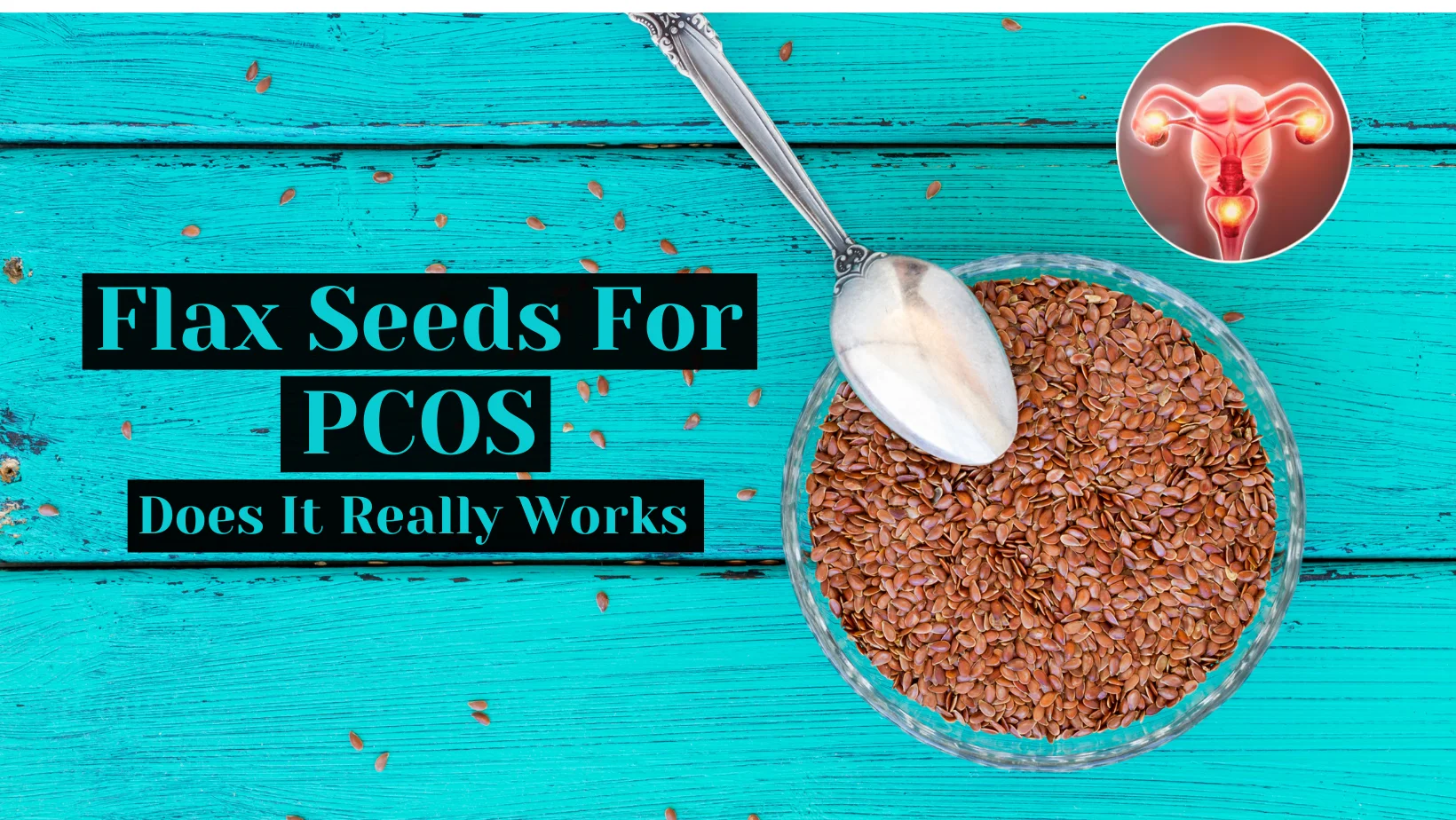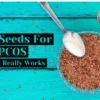Polycystic Ovary Syndrome (PCOS) is one of the most common hormonal disorders affecting women of reproductive age, with an estimated prevalence of 6-12%. It is characterized by irregular menstrual cycles, excess androgen (male hormone) levels, and the presence of multiple cysts in the ovaries.
Women with PCOS often experience a range of symptoms, including weight gain, acne, excessive hair growth, and infertility. Managing PCOS involves a multifaceted approach that includes dietary changes, exercise, medication, and natural supplements. Among the many natural remedies gaining attention, flax seeds have emerged as a promising tool for managing PCOS symptoms.
Flax seeds, also known as linseeds, are small brown or golden seeds derived from the flax plant (Linum usitatissimum). They are packed with essential nutrients such as fiber, omega-3 fatty acids, lignans, and antioxidants. These seeds are known for their potential health benefits, including improving heart health, aiding digestion, and balancing hormones. In this article, we will explore the role of flax seeds in managing PCOS symptoms and how they can be incorporated into a holistic approach to treatment.
Understanding PCOS and Hormonal Imbalance
To appreciate the benefits of flax seeds for PCOS, it is important to first understand the hormonal imbalances at the root of this condition. PCOS is primarily characterized by an excess of androgens, or male hormones, which disrupt normal ovarian function. This leads to the formation of small cysts in the ovaries, irregular or absent menstrual cycles, and challenges with fertility.
Another common issue in PCOS is insulin resistance, a condition in which the body’s cells become less responsive to insulin, leading to elevated blood sugar levels. Insulin resistance is often associated with weight gain and difficulty losing weight, and it increases the risk of developing type 2 diabetes.
The management of PCOS involves addressing these hormonal imbalances, reducing insulin resistance, and improving overall metabolic health. This is where flax seeds come in, as they offer several potential benefits that target these key aspects of PCOS.
Nutritional Profile of Flax Seeds
Before diving into the specific benefits of flax seeds for PCOS, it’s worth taking a closer look at their nutritional content:
- Omega-3 Fatty Acids: Flax seeds are one of the richest plant-based sources of alpha-linolenic acid (ALA), an essential omega-3 fatty acid. Omega-3s play a crucial role in reducing inflammation, supporting heart health, and promoting hormonal balance.
- Lignans: Flax seeds contain high levels of lignans, a type of phytoestrogen that can help balance estrogen levels in the body. Lignans also have antioxidant properties, which contribute to overall health.
- Fiber: Flax seeds are a great source of both soluble and insoluble fiber, which can aid digestion, improve gut health, and regulate blood sugar levels.
- Protein: Flax seeds provide plant-based protein, making them a good option for those looking to incorporate more protein into their diet, especially for vegetarians and vegans.
- Vitamins and Minerals: Flax seeds are rich in important nutrients such as vitamin B1 (thiamine), copper, magnesium, and manganese.
With this impressive nutritional profile, flax seeds have the potential to support the management of PCOS symptoms in several ways.
1. Hormonal Balance
One of the most significant benefits of flax seeds for women with PCOS is their ability to promote hormonal balance. The phytoestrogens found in flax seeds, particularly lignans, can help modulate estrogen levels in the body. Phytoestrogens are plant compounds that mimic the action of estrogen, the primary female hormone. In women with PCOS, estrogen levels may be imbalanced, which can contribute to irregular menstrual cycles and other symptoms.
Lignans work by binding to estrogen receptors in the body, helping to regulate estrogen activity. This can be particularly beneficial for women with PCOS who experience estrogen dominance, a condition where estrogen levels are disproportionately high relative to progesterone. By promoting a healthier balance of hormones, flax seeds may help regulate menstrual cycles and improve fertility in women with PCOS.
Furthermore, lignans have been shown to reduce androgen levels. Since PCOS is characterized by elevated androgen levels, consuming flax seeds may help alleviate symptoms such as acne, hirsutism (excessive hair growth), and scalp hair thinning.
2. Reducing Inflammation
Inflammation is a common underlying factor in PCOS and is closely linked to insulin resistance, obesity, and hormonal imbalances. Chronic low-grade inflammation can exacerbate PCOS symptoms and increase the risk of developing other health complications, such as cardiovascular disease.
Flax seeds are rich in omega-3 fatty acids, which have well-documented anti-inflammatory properties. By reducing inflammation, omega-3s may help improve insulin sensitivity, support weight management, and reduce the risk of heart disease in women with PCOS. Additionally, the anti-inflammatory effects of omega-3s can help alleviate other symptoms of PCOS, such as acne and fatigue.
3. Managing Insulin Resistance
Insulin resistance is a hallmark of PCOS, affecting up to 70% of women with the condition. When the body’s cells become resistant to insulin, it leads to elevated blood sugar levels, which can result in weight gain, increased appetite, and difficulty losing weight. Over time, insulin resistance can also increase the risk of developing type 2 diabetes.
Flax seeds may help improve insulin sensitivity and regulate blood sugar levels, thanks to their high fiber content. The soluble fiber in flax seeds forms a gel-like substance in the digestive tract, slowing down the absorption of sugar into the bloodstream. This helps prevent blood sugar spikes and promotes more stable blood sugar levels throughout the day.
Moreover, flax seeds’ ability to reduce inflammation also plays a role in improving insulin sensitivity. Studies have shown that chronic inflammation can contribute to insulin resistance, so by reducing inflammation, flax seeds may help mitigate this effect and support better blood sugar control.
4. Weight Management
Maintaining a healthy weight is a key factor in managing PCOS symptoms, as excess body weight can worsen insulin resistance and hormonal imbalances. However, weight loss can be particularly challenging for women with PCOS due to the metabolic disturbances associated with the condition.
Flax seeds may support weight management in several ways. First, their high fiber content promotes feelings of fullness and satiety, which can help reduce overall calorie intake and prevent overeating. The fiber also supports healthy digestion and regular bowel movements, which are essential for maintaining a healthy weight.
Additionally, the omega-3 fatty acids in flax seeds may help improve fat metabolism and reduce inflammation, both of which are important for weight loss and metabolic health. By incorporating flax seeds into a balanced diet, women with PCOS may find it easier to manage their weight and improve their overall health.
5. Heart Health
Women with PCOS are at an increased risk of developing cardiovascular disease due to the combination of insulin resistance, obesity, and elevated androgen levels. This makes it essential to focus on heart health when managing PCOS.
Flax seeds are beneficial for heart health in several ways. The omega-3 fatty acids in flax seeds help reduce inflammation, lower blood pressure, and improve cholesterol levels, all of which contribute to a healthier heart. Additionally, the soluble fiber in flax seeds can help lower LDL (“bad”) cholesterol levels by binding to cholesterol in the digestive tract and promoting its excretion from the body.
By supporting heart health, flax seeds can help reduce the risk of cardiovascular complications in women with PCOS.
6. Digestive Health
Digestive issues are common in women with PCOS, often due to a combination of hormonal imbalances, stress, and dietary factors. The high fiber content of flax seeds can support digestive health by promoting regular bowel movements and preventing constipation. Insoluble fiber adds bulk to the stool, while soluble fiber helps soften it, making it easier to pass.
Additionally, flax seeds may promote the growth of beneficial gut bacteria, which play a key role in maintaining a healthy digestive system. A balanced gut microbiome is essential for overall health, as it supports immune function, reduces inflammation, and improves nutrient absorption.
How to Incorporate Flax Seeds into Your Diet
Incorporating flax seeds into your diet is relatively easy, as they can be added to a variety of foods and beverages. However, it’s important to keep a few things in mind when using flax seeds to ensure you get the maximum benefits:
- Start Slowly: If you’re not used to consuming a lot of fiber, it’s a good idea to start with a small amount of flax seeds (about 1-2 tablespoon per day) and gradually increase your intake to avoid digestive discomfort.
- Add to Smoothies: One of the easiest ways to incorporate flax seeds into your diet is by adding a tablespoon of ground flax seeds to your morning smoothie. They blend well and add a subtle nutty flavor.
- Sprinkle on Oatmeal or Yogurt: Ground flax seeds can be sprinkled on top of oatmeal, yogurt, or cereal for added texture and nutrition.
- Bake with Flax Seeds: Flax seeds can be used in baking, such as in muffins, pancakes, and bread. They can also be used as an egg substitute in vegan recipes (1 tablespoon of ground flax seeds mixed with 3 tablespoons of water equals one egg).
- Mix into Salads and Soups: Ground flax seeds can be sprinkled on top of salads, soups, or roasted vegetables for a nutritional boost.
Conclusion
Flax seeds offer a wide range of potential benefits for women with PCOS, thanks to their ability to promote hormonal balance, reduce inflammation, improve insulin sensitivity, and support heart and digestive health.
By incorporating flax seeds into a balanced diet, women with PCOS may find relief from some of the most challenging symptoms of the condition.
However, it’s important to remember that flax seeds are not a cure for PCOS, and they should be used as part of a comprehensive approach to managing the condition. This includes working with a healthcare provider to develop a personalized treatment plan that may include dietary changes, exercise, medication, and other natural remedies.







11 thoughts on “Why Flax Seeds For PCOS? How It Helps?”
Pingback: rifaximin american express canada
Pingback: how to buy avodart without prescriptions uk
Pingback: get staxyn uk generic
Pingback: online order itraconazole generic for sale
Pingback: online order fildena generic australia
Pingback: gabapentin online saturday delivery
Pingback: cheap flexeril cyclobenzaprine buy for cheap
Pingback: cheapest buy dutasteride canada purchase
Pingback: purchase androxal generic india
Pingback: remise kamagra sans ordonnance
Pingback: comprar enclomiphene generico
You must be logged in to post a comment.